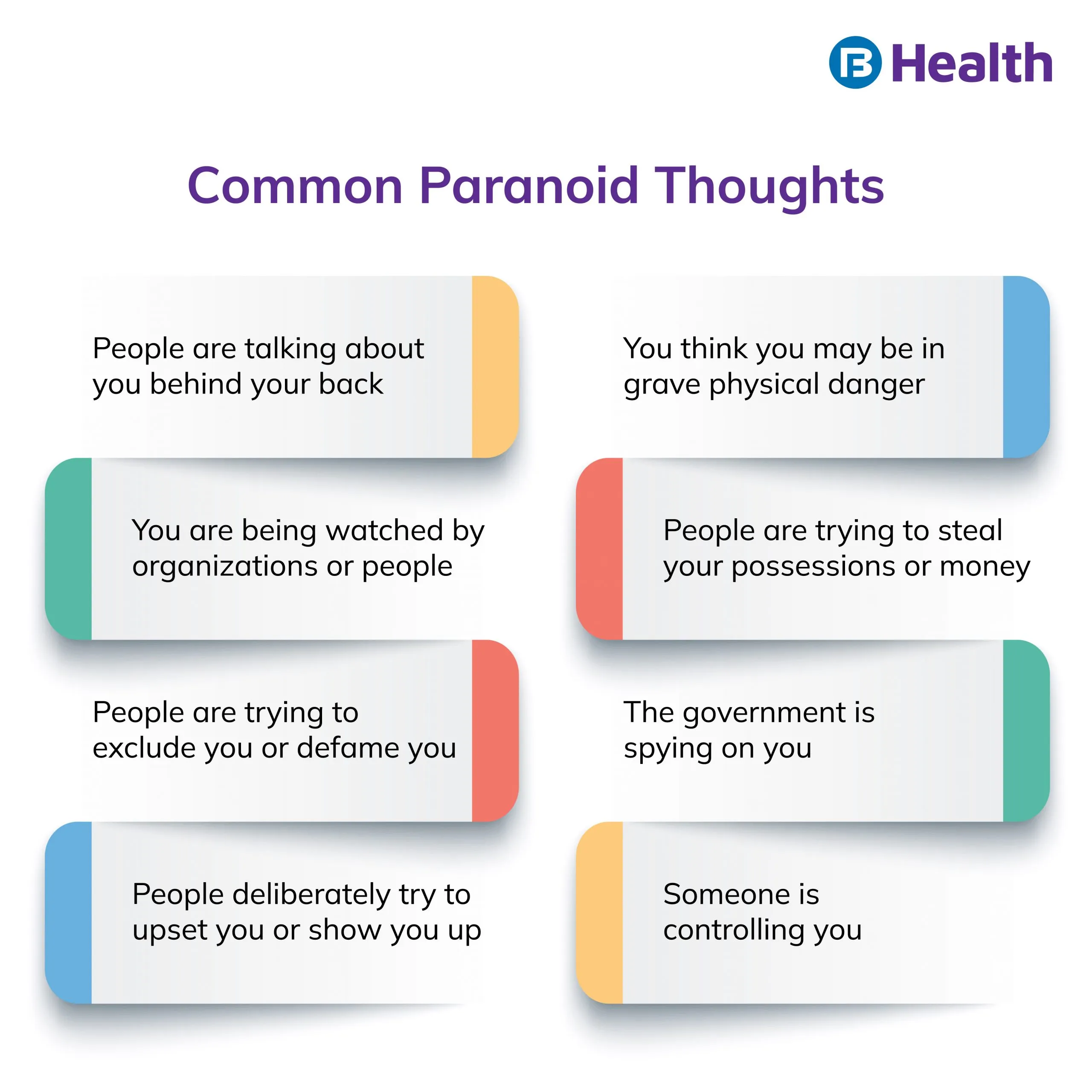Psychiatrist | 5 min read
What is Paranoia: Definition, Symptoms, Causes, Treatment
Medically reviewed by
Table of Content
Key Takeaways
- Paranoia symptoms include being overly suspicious and mistrustful of others
- The exact cause paranoia is unclear, but it may include genetics and trauma
- There is no cure for paranoia, but treatment can help manage the symptoms
The medical paranoia definition characterizes it as a mental illness. Here patients wrongly believe that people are trying to harm them. To understand the paranoia meaning or sensibility, look at it as a thought process that makes you irrationally and persistently distrust or suspect others. You may also feel like you are being persecuted or someone is out to get you. This mental disorder may also make you feel that you are in danger or physical harm even when you are not. This can make it difficult for you to build close social relationships or be present in social situations. Read more on what is paranoia and its treatment options.
Paranoia may also be a symptom of a personality disorder or other mental illnesses. People who have dementia or use drugs may also experience paranoia. In fact, those who have cancer in advanced stages may experience anxiety in the form of paranoia [1]. Even diabetes can lead to paranoid delusions if it is not under control.
Read on to know more about paranoia symptoms, types, causes, and treatment.
Additional Read: Types of Mental IllnessesTypes of paranoia disorders
Paranoia is mainly characterized in three different conditions. It is dependent on the extent of paranoid thoughts and their effects. Below is a list of this diseases disorders.
Paranoid personality disorder
This is as a mild form of paranoia. In this, you may be able to function despite your distrust in people around you. When you notice the behavior and attitude associated with this disorder, you may realize that they were present for a long time.
Delusional disorder
Considered as a serious mental disorder, you may not be able to tell what is real and what is not if you experience this type of paranoia. This stems from an unshakeable belief in something that is not true. You may believe that you have a severe illness despite reassurance from doctors. This disorder is further classified into 7 sub-types [2].
Paranoid schizophrenia
This is a severe disorder in which you may have an abnormal interpretation of reality. It is generally characterized by strange delusions that are either visual or auditory. It may include hearing voices or sounds or seeing something that is not present. It is a severe condition which may affect your daily life, but you can manage it with proper treatment.

What are common paranoia symptoms?
The symptoms of paranoia may vary for each person depending on the cause and type. Some general symptoms include the following:
- Being easily offended
- Not being able to cope with criticism
- Being defensive
- Having trouble trusting others
- Being unable to compromise
- Feeling overly suspicious
- Feeling anxiety or stress based on beliefs about others
- Assuming that people are badmouthing you
- Being aggressive, argumentative, or hostile
- Believing in conspiracy theories
What is a paranoid thought?
Such thoughts are usually associated with your views about others, what they may think or do. Deciding whether a suspicion is a paranoid thought or not can be difficult. Suspicious thoughts are usually considered paranoid if:
- You are the only one who has that suspicion
- There is no definitive evidence for your suspicion
- There is evidence against your suspicion
- You still have the suspicion despite repeated assurance
- Your suspicious thought is based on ambiguous events or feelings
What are the causes of paranoia?
The exact cause for paranoia is unclear and may depend on the type of condition associated with it. Some theories for causes include the following.
Genetics
Though the research is inconclusive, some of it suggests that your genes may have an effect on the possibility of developing paranoia. It is also unclear whether genetic predisposition to paranoia is inherited or not.
Environment
Based on certain research, parano is common if you live in isolated or urban environment. Violence, terrorism, or crime may also trigger paranoia.
Brain chemistry
Neurotransmitters and brain chemicals form the basis of feelings and thoughts. Certain drugs may alter your brain chemistry and can trigger paranoia. Based on this, some researchers suggest that paranoia may be biochemical disorder.
Traumatic event
Traumatic events during childhood or adult life may increase the possibility of developing paranoia. If you have been a victim of burglary, abuse, or a bully, your self-esteem may be affected. It could lead to negative feelings about yourself. This may cause you to have suspicious thoughts, which may lead to paranoia.
How is paranoia diagnosed?
Diagnosis of paranoia is difficult because it is also present in other mental conditions. It is also difficult because a paranoid person may not go to a doctor because of their fear of being harmed.
A common diagnostic process includes the following:
- Medical history
- Psychological tests
- Symptoms assessment
- Physical examination
- Tests that rule out other mental disorders
How is paranoia treated?
Currently there is no absolute cure for treating paranoia or the causes of paranoia. Treatment can help you cope with the symptoms and help you lead a better life. Your treatment will depend on the severity and the type of condition. It may include the following.
Antipsychotic and anti-anxiety drugs can help manage their symptoms. But because of the fear of being harmed, a paranoid person may refuse to take them.
- Coping skills
These skills can help improve your ability to function in a social setting. It may include techniques that help reduce anxiety, relaxation therapy, and behavior modification.
- Therapy
Like the other methods listed here, therapy can help you manage symptoms and improve your social abilities. But a person with paranoia may not talk freely and openly with a therapist. This can make progress extremely slow.
- Hospitalization
In severe and extreme cases, you may need hospitalization.
Additional Read: Take Care of Family Members with Psychiatric ProblemsKeep in mind that the treatment of paranoia may be a slow process. Since people with this diseases are distrustful of others, seeking treatment may be difficult for them. This is why if you see someone showing paranoia symptoms, you should encourage them to visit a doctor. Book an in-clinic or online doctor consultation on Bajaj Finserv Health. Talking to a therapist can help you or someone you know get the best treatment plan. This can help lead a better, productive life.
References
- https://acsjournals.onlinelibrary.wiley.com/doi/full/10.1002/cncr.22980
- https://my.clevelandclinic.org/health/diseases/9599-delusional-disorder#
Disclaimer
Please note that this article is solely meant for informational purposes and Bajaj Finserv Health Limited (“BFHL”) does not shoulder any responsibility of the views/advice/information expressed/given by the writer/reviewer/originator. This article should not be considered as a substitute for any medical advice, diagnosis or treatment. Always consult with your trusted physician/qualified healthcare professional to evaluate your medical condition. The above article has been reviewed by a qualified doctor and BFHL is not responsible for any damages for any information or services provided by any third party.






